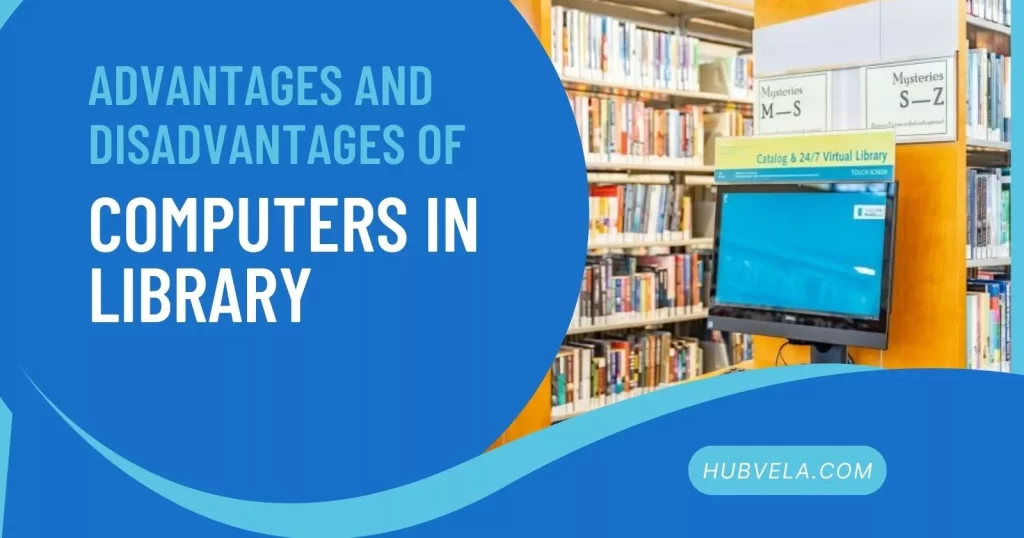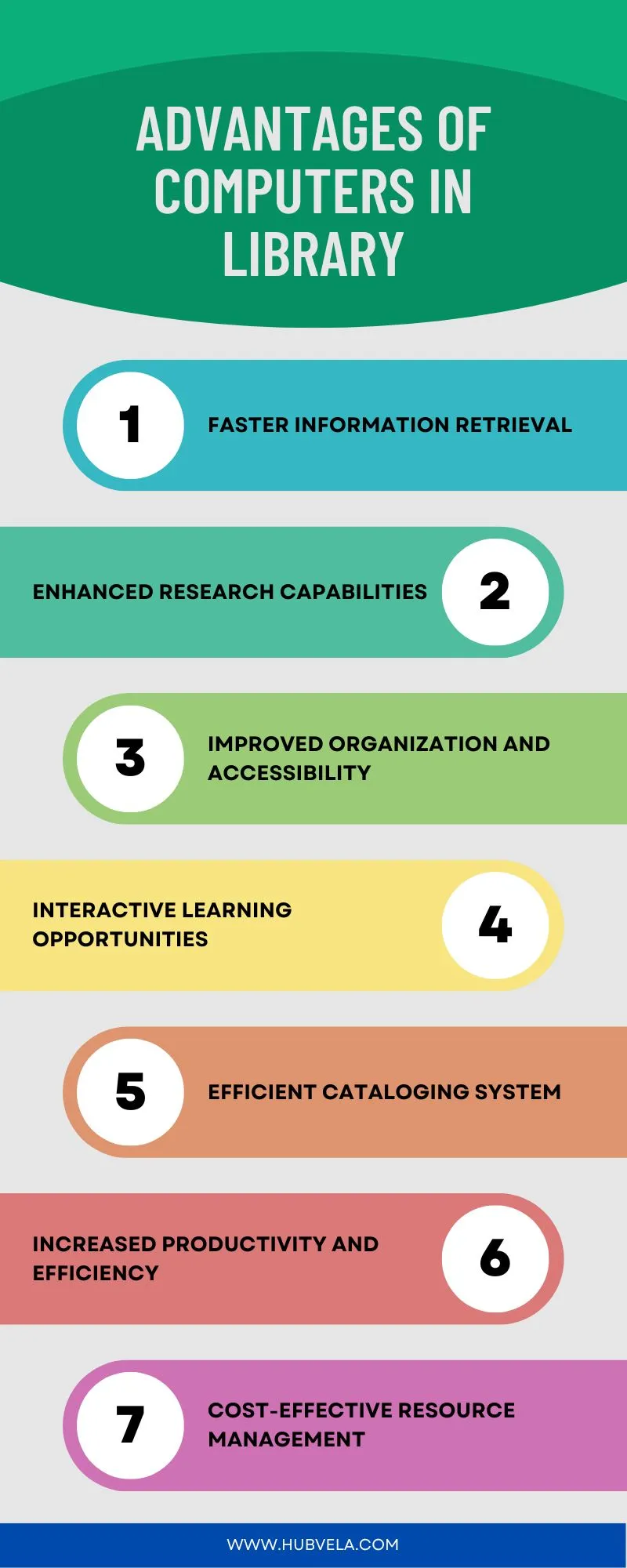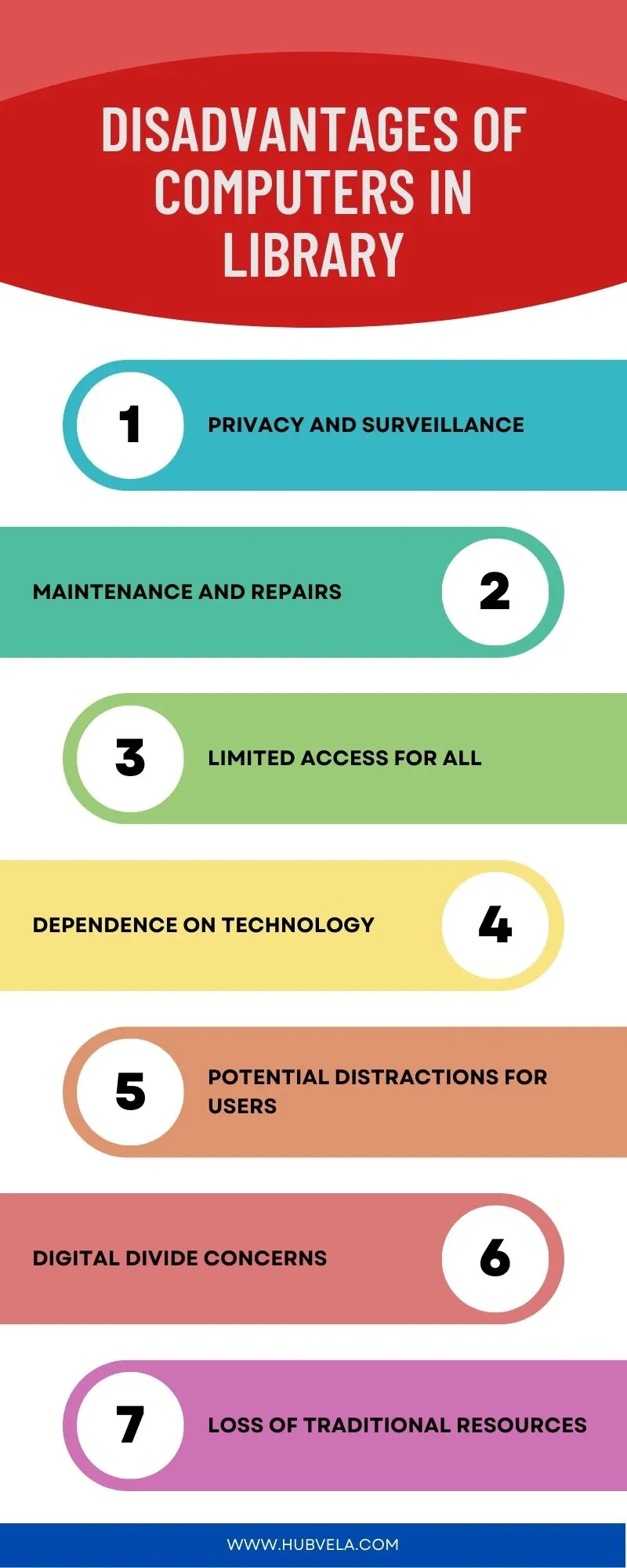Are you curious about the advantages and disadvantages of computers in library? Well, you’ve come to the right place!
By utilizing computers, libraries can offer faster information retrieval, enhanced research capabilities, improved organization, and increased accessibility. These technological tools also provide interactive learning opportunities.
However, it is important to consider the downsides as well. Computers can be potential distractions for users and raise concerns about the digital divide. Additionally, the integration of computers may lead to the loss of traditional resources.
So, let’s delve into the advantages and disadvantages of computers in the library and weigh their impact on the overall library experience.

--Advertisement--
Advantages of Computers in Library
The advent of computers and digital technology has revolutionized the way we access and engage with information, particularly in libraries.
Digital libraries offer numerous advantages over traditional libraries, making them more accessible, convenient, and efficient. Some of the key benefits of digital libraries include:

1. Faster Information Retrieval
Computers in the library offer the advantage of faster information retrieval. With improved searchability and quick information retrieval, you can access the data you need efficiently. Gone are the days of flipping through countless pages or searching through index cards.
Computers provide a streamlined research process, allowing you to find the information you need with just a few clicks. This efficient data access not only saves you time but also enhances your knowledge acquisition. Whether you’re a student working on a research paper or a curious individual seeking information, computers in the library make the process easier and more convenient.
Embrace the benefits of technology and enjoy the advantages it brings to your library experience.
2. Enhanced Research Capabilities
Improve your research capabilities with the use of computers in the library.
Computers offer several advantages that can enhance your research process.
One of the main benefits is the improved searchability of information. With the help of comprehensive databases, you can easily access a wide range of sources, including books, journals, and articles.
Moreover, computers ensure data accuracy since they eliminate the possibility of manual errors.
Additionally, advanced analysis tools available on computers allow you to analyze and interpret data more efficiently. You can use these tools to visualize data, perform complex calculations, and generate insightful reports.
Furthermore, computers in the library provide collaborative research opportunities, allowing you to connect and work with other researchers, fostering knowledge sharing and collaboration.
3. Improved Organization and Accessibility
By utilizing computers in the library, you can significantly enhance the organization and accessibility of resources available to you.
Computers allow for improved organization of library materials, making it easier to locate books, articles, and other resources. With the use of digital catalogs and databases, you can quickly search for specific titles or subjects, saving you time and effort.
Increased accessibility is another advantage of computers in the library. Digital resources can be accessed remotely, allowing users to retrieve information from anywhere, at any time. This enhances user convenience and eliminates the need to physically visit the library.
Furthermore, computers streamline processes such as checking out books and returning them, making transactions more efficient.
4. Interactive Learning Opportunities
Discover a wealth of interactive learning opportunities with computers in the library. Computers provide a platform for engaging users in interactive learning experiences. With access to various educational resources, users can explore different subjects and topics at their own pace.
Technology integration in libraries allows for the creation of interactive learning programs and activities, enhancing user engagement and promoting collaborative learning. Users can participate in virtual simulations, educational games, and online discussions to deepen their understanding of concepts.
Through technology, libraries can offer a range of multimedia resources, including videos, interactive tutorials, and e-books, catering to different learning styles. This integration of technology not only enhances the learning experience but also encourages self-directed learning and critical thinking skills.
With computers in the library, users can actively engage with educational content, fostering a dynamic and enriching learning environment.
5. Efficient Cataloging System
You can easily navigate and access library resources with the efficient cataloging system provided by computers.
Technology integration in libraries has revolutionized the way information is managed and organized. With the implementation of library automation, tasks such as cataloging, indexing, and searching for materials have become faster and more accurate.
The efficient cataloging system allows for improved user participation, as patrons can easily locate and retrieve the information they need.
This system streamlines the process of adding new materials to the library’s collection, making it easier for librarians to manage and update their inventory.
6. Increased Productivity and Efficiency
Maximizing productivity and efficiency, computers in the library enable you to seamlessly access and utilize a vast array of resources. One of the advantages of computers in the library is the increased collaboration they facilitate. With computers, you can easily connect with other library users and exchange information and ideas. This collaboration leads to a more comprehensive understanding of the subject matter and promotes a sense of community among library users.
Additionally, computers in the library provide time-saving tools such as online search engines and databases, which allow you to quickly find and retrieve information. These tools eliminate the need for manual searching, saving you precious time and effort. Furthermore, computers improve accuracy by providing access to updated and reliable sources. This ensures that the information you gather is current and trustworthy.
Computers in the library also provide an enhanced learning experience. With multimedia resources and interactive platforms, you can engage with the material in a more dynamic and immersive way. Lastly, computers streamline workflows by automating repetitive tasks, such as organizing and categorizing information. This frees up your time and energy, allowing you to focus on more important tasks.
7. Cost-Effective Resource Management
By utilizing computers in the library, you can effectively manage resources in a cost-effective manner. One of the advantages of computers in library is their ability to optimize resource allocation and budget. With technology integration, you can track and analyze data related to resource usage, allowing you to make informed decisions on how to allocate resources more efficiently.
Disadvantages of Computers in Library
The widespread use of computers in libraries has brought numerous advantages, but it also comes with some disadvantages. We will discuss the key drawbacks of relying on computer technology in libraries, including:

1. Privacy and Surveillance
You may experience a loss of privacy and increased surveillance when using computers in the library. Privacy concerns arise due to the potential risks of surveillance, compromising your data protection and personal information.
Libraries often implement user monitoring systems to track computer usage, which can lead to a lack of anonymity and privacy. This may include monitoring internet browsing history, keystrokes, and even capturing screenshots. The ethical considerations surrounding this practice are important to address, as it raises questions about the balance between user privacy and library security.
While surveillance measures may be intended to prevent misuse or illegal activities, it’s crucial to find a balance that respects user privacy rights. Libraries should prioritize user privacy and ensure that they’ve clear policies and safeguards in place to protect their users’ data.
2. Maintenance and Repairs
To address the disadvantages of computers in the library, it’s essential to consider the maintenance and repairs required to keep the systems running smoothly.
One major drawback is the maintenance costs associated with keeping the computers in good working condition. Troubleshooting issues can be time-consuming and may require technical support, adding to the overall expenses.
Additionally, regular software updates are necessary to ensure that the computers are secure and running efficiently. These updates can be time-consuming and may disrupt library services.
Another disadvantage is the possibility of hardware malfunctions, which can lead to system downtime and inconvenience for library patrons.
3. Limited Access for All
Although computers in the library can provide numerous advantages, there are also disadvantages, such as limited access for all patrons. One of the main challenges is the digital divide, which refers to the gap between those who’ve access to technology and those who do not. This can create barriers to accessing equitable resources, as not everyone may have the necessary skills or devices to use the computers effectively.
Additionally, internet limitations can further hinder access, especially in areas with slow or unreliable connections. Technological barriers, such as outdated equipment or software, can also impede patrons from fully utilizing the computers. These accessibility challenges highlight the need for libraries to address these issues and strive for greater inclusivity when providing computer access to their patrons.
4. Dependence on Technology
The dependence on technology in libraries can have its disadvantages, particularly in terms of potential technical difficulties.
While computers in libraries offer a wealth of information and resources, there’s a risk of information overload. With a vast amount of data available at the click of a button, it can be overwhelming for users to navigate and find the information they need.
Additionally, the learning curve associated with using new technologies can be a challenge for some library patrons, especially those who aren’t familiar with computers.
Furthermore, there’s always a concern for data security when relying on technology in libraries.
The accessibility of computer systems can also be an issue for individuals with disabilities, as not all systems are designed to accommodate their specific needs.
5. Potential Distractions for Users
Stay focused and avoid potential distractions while using computers in the library.
Although computers in the library offer numerous advantages, they can also negatively impact the user experience. One of the main disadvantages is the potential for distractions. With the constant flow of people coming and going, noise levels tend to rise, making it difficult to concentrate on tasks at hand.
Additionally, the allure of multitasking can be tempting, causing users to lose track of time and become less productive. It’s crucial for users to practice effective time management and prioritize their tasks to avoid getting sidetracked.
6. Digital Divide Concerns
To address digital divide concerns, prioritize providing equitable access to computers in the library. Bridging the gap between those who’ve internet access and those who don’t is crucial in today’s digital age.
By offering free computer usage, libraries can help individuals who may not have access to the internet at home or can’t afford it. Additionally, libraries can provide resources and programs that promote digital literacy, helping individuals develop the necessary skills to navigate the online world.
Community outreach initiatives can also be implemented to reach underserved populations and educate them about the benefits of using computers and the internet. Technological barriers, such as outdated equipment or limited bandwidth, should be addressed to ensure equal access for all library users.
7. Loss of Traditional Resources
If you rely solely on computers in the library, you may find yourself limited in access to traditional resources. While computers offer numerous advantages in terms of information accessibility and the availability of digital resources, they also pose certain disadvantages.
One major drawback is the loss of traditional resources. Many libraries still house valuable books, manuscripts, and other physical materials that provide a unique and tangible experience for users. These resources may not be available in digital format, and their preservation poses significant challenges.
Furthermore, some users may have a preference for using physical books or materials for research or personal enjoyment. Relying solely on computers in the library can limit the options available to users and overlook the value of traditional resources.
Conclusion on Advantages and Disadvantages of Computers in Library
As you consider the advantages and disadvantages of computers in the library, it becomes clear that their integration has both positive and negative implications.
On the positive side, computers in the library offer numerous benefits. They provide access to a vast amount of information, allowing users to find resources quickly and efficiently.
Additionally, computers enable users to access online databases, e-books, and digital resources, expanding the range of available materials. They also allow for easier organization, retrieval, and sharing of information.
On the negative side, computers can lead to a loss of human interaction and personal connection. They may also require additional funding for maintenance, software updates, and technical support.
Furthermore, reliance on technology may exclude people who lack computer literacy skills or don’t have access to computers.


